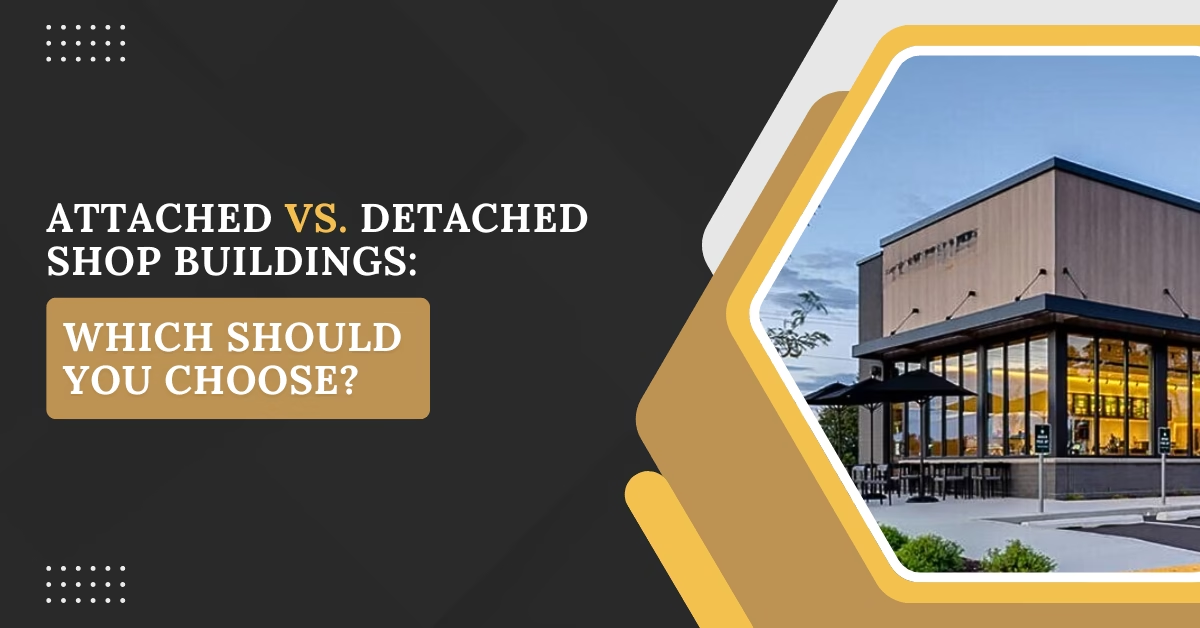You’ve got the vision. Maybe it’s a quiet space to rebuild that classic truck or finally launch your woodworking side hustle. You’re ready to build your dream shop—but now you’re stuck at the very first step. Attached vs. detached shop buildings: which one fits your needs, space, and budget best?
It seems simple, but picking the wrong layout can make daily use frustrating or even limit future plans. One man I knew turned his garage into a shop—until his wife complained about the sawdust floating into the kitchen. He ended up rebuilding a detached version months later. Don’t make that mistake.
Let’s break down both options, compare them clearly, and walk through the smart way to make your shop-building decision.
Quick Comparison Table
| Feature | Attached Shop | Detached Shop |
| Connected to Home | Yes | No |
| Construction Cost | Lower (shares utilities/walls) | Higher (separate structure and utilities) |
| Weather Access | Indoors | Walk outside |
| Noise and Odors | May affect home interior | Isolated from the living space |
| Layout Flexibility | Limited by the existing home structure | Full creative control |
| Use for Business | Less ideal for clients | Better suited for commercial use |
| Zoning Requirements | Often simpler | May require separate approval |
| Expansion Potential | Limited | More adaptable to future growth |
What Is an Attached Shop Building?
An attached shop is physically connected to your home—either through a shared wall, an extension, or even a converted garage or basement. This kind of setup is especially common in suburban or residential neighborhoods, where space is limited and homeowners want quick access without stepping outside.
Why Choose an Attached Shop?
Convenience tops the list. You can walk straight from your kitchen into the shop without facing wind, snow, or mud. For anyone in a region with unpredictable weather, that’s a big perk.
Plus, you often save on construction costs. Since attached shops share structural components—walls, roofing, or utilities—they’re generally cheaper to build than their standalone cousins.
Attached shops also tend to be easier when it comes to permits and zoning. Many local codes treat them as extensions of your house, so you might avoid some of the red tape that comes with building a standalone structure.
But what’s the downside?
Well, let’s talk noise. If you’re firing up a table saw, your whole family will know. Sound travels fast through shared walls. Then there are the smells—paint fumes, chemical cleaners, welding sparks—they have a way of drifting into your living space unless you have serious ventilation.
Lastly, you’re locked into your existing structure. Want taller ceilings? Wider doors? More floor space? You’ll have to work around the limitations of your current home’s architecture.
So, if your projects are quiet, clean, and mostly for personal use, an attached shop might be just fine. But if your work gets messy or loud, it may quickly outgrow the space.
What Is a Detached Shop Building?
Now let’s talk about freedom. A detached shop stands completely separate from your home, like a dedicated outbuilding on your property. You might build it from scratch, convert a barn, or even move a prefab structure onto your lot. It’s yours to shape how you want.
Why Detached Shops Are Popular
First off, you gain total creative control. Want oversized doors, high ceilings, or dedicated work zones? Detached structures offer nearly unlimited possibilities when it comes to shop layout types.
Second, detached shops keep your home clean and quiet. You can hammer, cut, weld, paint—do all the dirty stuff—without disturbing anyone inside the house.
They’re also better suited for business purposes. If you’re planning to invite clients or use the space for a small commercial construction startup, a detached shop gives a more professional impression and protects your home’s privacy. And yes, future expansion is easier. Need to add another bay, build upward, or expand your tools? Detached buildings give you room to grow.
What to Watch Out For
The main downside is cost. You’ll need a separate foundation, electricity, plumbing, heating, and all the materials that go into a stand-alone structure.
Also, depending on your area, a detached shop might face stricter zoning laws or setback regulations, which can delay your project or require more paperwork.
And don’t forget the weather. In winter, you’ll need to walk through the snow to reach your shop. It’s not a deal-breaker, but it’s something to keep in mind.
Key Factors to Consider Before Choosing
So now that we’ve covered the differences between attached vs. detached shop buildings, how do you decide which one is right for you?
Here are the most important questions to ask yourself during your shop-building decision:
1. What’s the Purpose of Your Shop?
Are you using it for personal hobbies? Storage? Running a business? Hosting clients?
A simple workspace for crafting or light-duty repairs may work great as an attached shop.
But if you’re running equipment, storing large machinery, or seeing customers, a detached layout usually wins for function and professionalism.
2. How Much Noise, Smell, or Dust Will You Create?
It’s one thing to tinker quietly. It’s another to create enough noise to rattle the windows or fumes that travel through HVAC vents.
If your projects generate a lot of mess, a detached shop keeps your living space untouched. It’s also easier to install specific ventilation, dust collection, or noise-dampening features when you’re starting from scratch.
3. What Does Your Property Allow?
Your property layout and local codes might determine your options before you do.
Some neighborhoods have strict restrictions on commercial construction, detached buildings, or lot setbacks.
Others may require architectural review before approving your plans.
Always review local zoning and HOA rules. Talking to a professional or reviewing basic shop construction tips can save you major delays later.
4. What’s Your Long-Term Plan?
Sure, it’s a shop for now—but what about five years from now?
Will you want more space for new tools? Planning to sell the home and want added resale value? Looking to build a rental unit on top?
Detached shops offer flexibility. You can expand, renovate, or even convert them into a guest suite down the line.
5. What’s Your Budget?
Let’s be honest—cost always matters.
Attached shops are usually more affordable. You’re using existing walls and utilities, which lowers labor and material costs.
Detached shops cost more upfront but may deliver better long-term value, especially if they can be repurposed, expanded, or generate income.
If you’re working with a limited budget but expect your shop to grow, consider starting small and leaving room for future expansion.
Which Should You Choose?
At this point, you’ve seen the strengths and trade-offs of each. So here’s a simple breakdown to help guide your shop-building decision:
Choose an attached shop if:
- You want quick, indoor access from your house.
- Your projects are quiet, clean, and personal.
- You’re working with a smaller budget.
- Your lot doesn’t allow for extra structures.
Choose a detached shop if:
- Your work involves noise, dust, chemicals, or heavy tools.
- You’re planning to grow or run a small business.
- You want creative freedom in design and layout.
- You need more room, separation, and long-term flexibility.
If you’re still on the fence, think about what will make your day-to-day easier. Picture yourself walking into the space. Are you rolling in on a motorcycle? Hosting a client? Painting custom signs? Your answer lies in how you plan to live and work in the space, not just what’s cheaper or quicker.
Final Thoughts
Building a shop isn’t just about tools and walls. It’s about how the space fits into your life, your workflow, and your future.
An attached shop might be perfect for a DIY hobbyist who wants convenience and affordability. A detached shop, on the other hand, offers the independence and scalability that many business owners or serious creators need.
No matter what you choose, remember this: a smart shop isn’t built overnight. Use good shop construction tips, understand your needs, and think a few years ahead. That’s the difference between building something useful and building something you truly love.
Ready to build the perfect shop space? Connect with Legacy Home Solutions and bring your vision to life—exactly how you need it.
Important FAQs
1. Do attached or detached shops affect home insurance rates?
Yes. Insurance premiums may vary depending on whether the shop is attached or detached, especially based on fire risk, usage, and coverage type.
2. Can a detached shop include living quarters or an apartment?
In many areas, yes—if local zoning allows it. Detached shops are often expanded into ADUs (accessory dwelling units) with proper permits and utilities.
3. What foundation type is best for a detached shop?
Detached shops often use slab-on-grade foundations for durability and cost-efficiency, but pole barns and pier foundations are also options based on soil and budget.
4. Are there tax implications when adding a detached shop?
Detached buildings may increase property tax assessments more than attached ones, depending on square footage, purpose, and local tax rules.
5. Can I convert an attached garage into a shop legally?
Usually, yes—but you’ll need to check if your town requires permits or upgrades (like ventilation, electrical changes, or egress) for code compliance.



